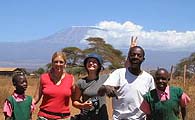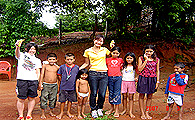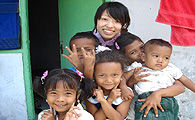
| Internatinal workcamps | |
| In Japan &Asia | |
 |
Pop Bridge between local and global communities | |||||||||
| Japanese | Contact | |||||||||
| What is NICE |
|
Long & middle term volunteer | Weekend workcamps | Group workcamps | Other projects of NICE | |||||
What are International Workcamps !? |
International voluntary projects, where volunteers from all over the world live and work together with local communities. They are primarily for 2 to 3 weeks through July and September with 10 to 30 participants. |
Brief History |
||
In 1920, the first workcamp was started in France by German and French youths reconstructing the farms destroyed during World War I. Since then, workcamps have been spreading throughout the world. In the 60’s, the primary focus was on construction, organized in new country locations as well as peace projects between Eastern and Western Europe. Environmentally directed workcamps have been on the increase since the 80’s. In 2008, 3,000 projects took place in 98 different countries. |
 |
|
Voluntary Projects |
||
| Usually for 6-8 hours a day and 5 days a week. The types of projects vary. |
||
| Environment | ||
Cleaning rivers, planting trees, animal conservation?and ecosystem protection, creating eco-villages, etc. |
||
| Agriculture | ||
| Picking fruits or seeding in organic farms, reviving uncultivated fields, etc. | ||
| Arts/Education | ||
| Organizing festivals, performing play against AIDS in schools, archaeology, etc. | ||
| Construction | ||
| Schools, toilets, renovating castles, converting farms into youth centers, etc. | ||
| Social work | ||
| With and for children, refugees, mentally or physically disadvantaged people, elders, etc. | ||
| Others | ||
| Advocacy of town planning proposals, recycling and sending bicycles to India, etc. | ||
Accommodations & Leisure activities |
||
Accommodation is typically in youth centers, public halls, schools and sometimes tents or temples that are simple but make for a dynamic group life! Volunteers often take turns cooking and get to enjoy many different international cuisines. The common language is English in a majority of the workcamps although you are encouraged to try to communicate in the local language. In some workcamps, the hosts or the volunteers organize discussions, sports programs, excursions, school visits and exchanges with local people. It is very important to note that workcamps are a shared experience created by all the volunteers and the local community. Volunteers are not guests! |
 |
|
Workcamp Organizations |
||
Most of Workcamp Organizations (WOs) are non-governmental and or non-profit organizations(NGO/NPOs). Most of WOs're affiliated with CCIVS (Coordinating Committee for International Voluntary Service) founded by UNESCO in 1948 to assist and promote workcamps in the world. |
 |
|
Finance |
||
Most WO manage running costs through inscription fees from volunteers and some are additionally supported by governments, foundations, etc. Volunteers need to pay the travel cost to and from workcamps and a fee to WO in their own countries. Local partners provide food and accommodation, although an additional participation fee ranging from USD 100-200 might be necessary for most workcamps in Africa, South Asia, etc.
|
.JPG) |
|
| Never ending International workCamps Exchange | |||||
| Copyright(C) 2006- NICE All rights reserved | HOME | ||||